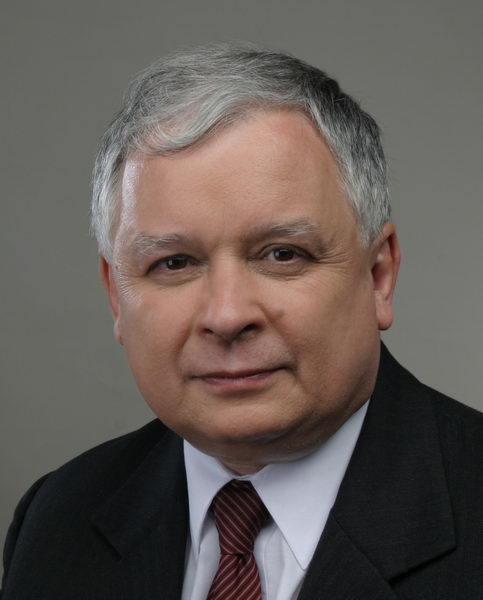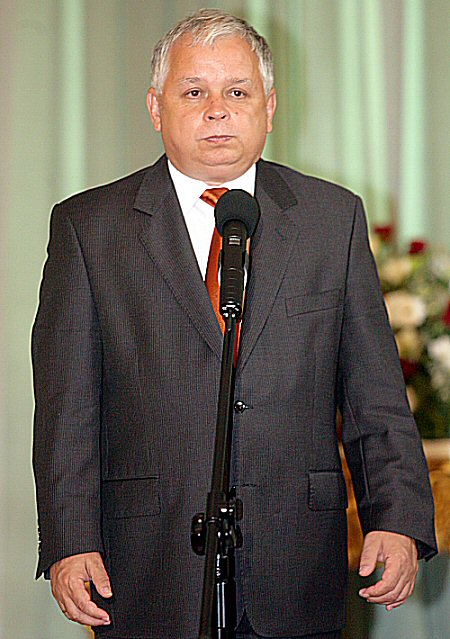| Sponsored Links | |
Polish President Lech Kaczynski, His Wife and 94 Others Killed In Plane Crash in Russia
Polish President Lech Kaczynski and some of the country’s highest military and civilian leaders died on Saturday when the presidential plane crashed as it came in for a landing in thick fog in western Russia, killing 96, officials said.
Russian and Polish officials said there were no survivors on the 26-year-old Tupolev, which was taking the president, his wife and staff to events marking the 70th anniversary of the massacre of thousands of Polish officers by Soviet secret police.
The crash devastated the upper echelons of Poland’s political and military establishments. On board were the army chief of staff, national bank president, deputy foreign minister, army chaplain, head of the National Security Office, deputy parliament speaker, civil rights commissioner and at least two presidential aides and three lawmakers, the Polish foreign ministry said.
Although initial signs pointed to an accident with no indication of foul play, the death of a Polish president and much of the Polish state and defense establishment in Russia en route to commemorating one of the saddest events in Poland’s long, complicated history with Russia, was laden with tragic irony.
Reflecting the grave sensibilities of the crash to relations between the two countries, Russian Prime Minister Vladimir Putin personally assumed charge of the investigation. He was due in Smolensk later Saturday, where he would meet Polish Prime Minister Donald Tusk, who was flying in from Warsaw.
The Polish presidential plane was headed for a military airport, North Smolensk, located near an aviation plant.
Andrei Yevseyenkov, spokesman for the Smolensk regional government, said Russian dispatchers asked the crew to land in either Minsk, the capital of neighboring Belarus, or in Moscow because of the fog.
“But the crew made an independent decision to land in Smolensk,” Yevseyenkov said in televised remarks.
No one answered the phone at the airport throughout the afternoon Saturday.
Russia’s Emergency Ministry said there were 96 dead, 88 of whom were part of a Polish state delegation. Poland’s Foreign Ministry spokesman, Piotr Paszkowski, said there were 89 people on the passenger list but one person had not shown up for the roughly 1 1/2-hour flight from Warsaw’s main airport.
Polish Prime Minister Donald Tusk said he had ordered a two-minute silence at noon (1000GMT) Sunday.
“The contemporary world has not seen such a tragedy,” he said, offering his “deepest sympathy” to the president’s family.
Tusk noted that condolences were pouring in from around the world and noted that “the first came from (Russian) Prime Minister Vladimir Putin and President Dmitry Medvedev.”
Also among the victims was Anna Walentynowicz, whose firing in August 1980 from the Lenin Shipyards in Gdansk sparked a workers’ strike that spurred the eventual creation of the Solidarity freedom movement. She went on to be a prominent member.
The deaths were not expected to directly affect the functioning of Polish government: Poland’s president is commander in chief of its armed forces but the position’s domestic duties are chiefly symbolic. The prime minister and other top government ministers were not aboard the plane.
Poland has long discussed replacing the planes that carry the country’s leaders but said they lacked the funds. The presidential Tu-154 had been overhauled in December in Russia, officials said.
Poland’s parliament speaker, the acting president, declared a week of national mourning.
The plane tilted to the left before crashing, eyewitness Slawomir Sliwinski told Rossiya-24. He said there were two loud explosions when the aircraft hit the ground.
State news channel Rossiya-24 showed footage from the crash site, with pieces of the plane scattered widely amid leafless trees and small fires burning in woods shrouded with fog. A tail fin with the red and white national colors of Poland stuck up from the debris.
“The Polish presidential plane did not make it to the runway while landing. Tentative findings indicate that it hit the treetops and fell apart,” regional governor Sergei Anufriev said on Rossiya-24. “Nobody has survived the disaster.”
According to the Aviation Safety Network, there have been 66 crashes involving Tu-154s, including six in the past five years. The Russian carrier Aeroflot recently withdrew its Tu-154 fleet from service.
The presidential plane was fully overhauled in December, the general director of the Aviakor aviation maintenance plant in Samara, Russia told Rossiya-24. The plant repaired the plane’s three engines, retrofitted electronic and navigation equipment and updated the interior, Alexei Gusev said. He said there could be no doubts that the plane was flightworthy.
Russian Prime Minister Vladimir Putin and President Dmitry Medvedev both called Polish Prime Minister Donald Tusk to express their condolences and they promised to work closely with Poland in investigating the crash.
“On this difficult day the people of Russia stand with the Polish people,” Medvedev told Tusk, the Kremlin press service said.
Putin, who has been put in charge of the commission investigating the crash, told Tusk that he would keep him fully briefed, his spokesman said.
Polish-Russian relations had been improving of late after being poisoned for decades over the Katyn massacre of some 22,000 Polish officers.
Russia never has formally apologized for the murders but Putin’s decision to attend a memorial ceremony earlier this week in the forest near Katyn was seen as a gesture of goodwill toward reconciliation. Rossiya-24 showed hundreds of people around the Katyn monument, many holding Polish flags, some weeping.
In Warsaw, Tusk called an extraordinary meeting of his Cabinet and the national flag was lowered to half-staff at the presidential palace, where people gathered to lay flowers and light candles.
Black ribbons appeared in some windows in the Polish capital.
Kaczynski, 60, became president in December 2005 after defeating Tusk in that year’s presidential vote.
The nationalist conservative was the twin brother of Poland’s opposition leader, former Prime Minister Jaroslaw Kaczynski. Kaczynski’s wife, Maria, was an economist. They had a daughter, Marta, and two granddaughters.
Kaczynski had said he would seek a second term in presidential elections this fall. He was expected to face an uphill struggle against Parliament speaker Bronislaw Komorowski, the candidate of Tusk’s governing Civic Platform party.
Poland was due to hold elections in the fall, though no date had been set.
However, the constitution says the parliament speaker, who takes on the duties of president, must announce early elections within 14 days of the president’s death.
The vote must be held within another 60 days. This means Poland will be holding early presidential elections before June 20.
In the village of Gorzno, in northern Poland, the streets were largely empty as people stayed home to watch television.
“It is very symbolic that they were flying to pay homage to so many murdered Poles,” said resident Waleria Gess, 73.
“I worry because so many clever and decent people were killed,” said high school student Pawel Kwas, 17. “I am afraid we may have problems in the future to find equally talented politicians.”
Klaus Bachmann, a professor of politics at Wroclaw University, said the president “wasn’t very popular and it was quite obvious that he would lose the upcoming elections.”
“The open question is what will Kaczynski’s party and his brother do; he might decide to run for president himself, he might also consider to withdraw from politics at all because he had a very very close link to his brother and I can’t imagine how much shocked he must be.”
Poland, a nation of 38 million people, is by far the largest of the 10 formerly communist countries that have joined the European Union in recent years.
Last year, Poland was the only EU nation to avoid recession and posted economic growth of 1.7 percent.
It has become a firm U.S. ally in the region since the fall of communism — a stance that crosses party lines.
The country sent troops to the U.S.-led war in Iraq and recently boosted its contingent in Afghanistan to some 2,600 soldiers.
U.S. Patriot missiles are expected to be deployed in Poland this year. That was a Polish condition for a 2008 deal — backed by both Kaczynski and Tusk — to host long-range missile defense interceptors.
The deal, which was struck by the Bush administration, angered Russia and was later reconfigured under President Barack Obama’s administration.
Under the Obama plan, Poland would host a different type of missile defense interceptors as part of a more mobile system and at a later date, probably not until 2018.
Kaczynski is the first serving Polish leader to die since exiled World War II-era leader Gen. Wladyslaw Sikorski in a plane crash off Gibraltar in 1943.













No comments:
Post a Comment